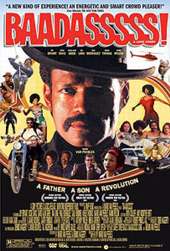|  MOVIE
BIASES: None. Just heard it's about Mario's dad. MOVIE
BIASES: None. Just heard it's about Mario's dad.
MAJOR PLAYERS: Joy Bryant (Honey), David Alan Grier (Boomerang),
actor/producer/writer/director Mario Van Peebles (New Jack
City)
You hear that? That's the sound of "Baadasssss!"
buzz buzz buzzing all over select theaters around the country.
And, for once, it's for a movie that totally deserves it.
Documenting father Melvin Van Peebles' struggle to get what
turned out to be the first blaxploitation labeled movie
to the screen, Mario plays his father back in the '70s when
Melvin was hot off his race comedy "Watermelon Man,"
angling to set up his next provocative project. Wanting
to star "all the faces Norman Rockwell never painted,"
Melvin pitches a strong-willed, almost silent hero for his
script "Sweetback's Baadasssss Song" to the studios'
predictable disinterest. Aligning with hippie white boy
Bill (Rainn Wilson) and his eager, overdramatic secretary
Priscilla (Bryant), Melvin assembles a motley, multiracial
cast and crew of porn stars and producers, hippies, drug
dealers, and children to create the ultimate – and
pioneering – independently financed movie experience.
This movie truly does capture the spirit and mood of the
'70s. Foursomes, free love, baby blue suits, mushroom collars,
drug popping like Tic Tacs – it's all there. The talented
if not curious Van Peebles who, like his father, has always
been a literal jack of all trades, stays true to the psychedelic,
colorful, sexually carefree era, where you could have sex
side by side with your friend and his dog with no one batting
an eyelash. Van Peebles' script, based off his father's
recollections and film, contains great dialogue and events
simply too bizarre to make up. It has a bit of a documentary
feel to it, with a series of "Real World" style
confessionals from the characters throughout of the barely
organized chaos of the indie film world Van Peebles was
creating.
Despite a microscopic million dollar budget and no studio
support, credit Mario for assembling a talented, eclectic
cast. Joy Bryant is cute as the forever-auditioning actress-secretary
Priscilla; David Alan Grier, with his high-arching eyebrows,
is dryly hilarious as porn-turned-legit producer Clyde Houston;
Rainn Wilson's Bill Harris is trippy good fun as that down-for-whatever,
free love rolldawg every hero needs; and Khleo Thomas (The
Rundown) is a talented, brave kid, playing the stoically
observant young Mario thrust in age-defying situations.
The habitually swole Mario Van Peebles, although pushing
fifty, is still an apropos brooding physical specimen for
his unlit cigar chomping father, who's unwavering self-confidence
and singularity of purpose is astounding considering the
mounting debts, deteriorating health, and sacrificing of
everything he had to get this one film made. Even his descent
into egolomania is impressive, as it's still wracked by
a haunting Sweetback character who taunts him at every turn
to deter him from finishing the film. Mario's portrayal
of his dad's complex family relationship with his kids is
as meta as meta filmmaking gets (Mario's compared it to
million dollar "psychotherapy").
Yet what this film leaves you with is a sense of empowerment.
There are several black films that make me so mad, I can
rarely watch them. I've owned "Panther," "Rosewood,"
and the like but they make me so mad at the racial injustices
of the past that persist in the present, I simply can't
watch them anymore. Ironically, the forces that conspired
against "Sweetback's" being a studio film back
in 1971 are still around today, as every studio in town
turned down Mario's uncompromising, multilayered, socially
significant script, wanting to coon it up with some more
comedy and/or rappers or claiming it was too unbelievable
for black men to have such complex relationships with their
sons. Seriously. Just to see the struggle to get "Sweetback"
– a marginally artistic film that, inadvertently,
ushered in the blaxploitation genre for its take-no-crap-from-whitey
stance – to the screen makes this film all the more
culturally relevant and significant today. The elder Van
Peebles pioneered the use of soundtracks as film marketing,
non-union crews, independent financing, hell, independent
filmmaking in general. This film is equal parts indie film
primer, father-son coming of age story, and sociology as
entertainment. "Baadasssss!" is easily as important
as Spike Lee's racially cauterizing "Bamboozled,"
my movie of the year in 2000 – with a better ending
to boot. This is a film I WILL be watching again.
If ever there was a "School Daze"-like wake up
call to black Hollywood, this is it. We don't need to settle
for hot garbage like "Soul Plane," the worst kind
of socially reckless "blaxploitation" film in
a time where we don't need it. We can have engaging, complex,
and humorous films that anger, incite, uplift, empower,
and, above all, entertain. Elder Melvin is fond of saying
"The Golden Rule: He who has the gold, makes the rule."
Whether studio Hollywood recognizes it or not, we have gold.
Melvin and Mario remind us that we can still make our own
rules.
@@@@ REELS
(FOUR REELS)
An urban classic/instant legend.
Like what you read? Agree/disagree with The Reel Deal? Think
he's talkin' out his...HUSH YO' MOUF! (I'm only talkin'
about The Reel Deal!) Email him at ReelReviewz@aol.com!
Edwardo Jackson is the author of the novels EVER AFTER and
NEVA HAFTA, (Villard/Random House), a writer for UrbanFilmPremiere.com,
and an LA-based screenwriter. Visit his website at www.edwardojackson.com
© 2004, Edwardo Jackson
|